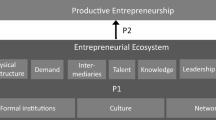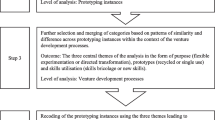Abstract
The purpose of this paper is to elaborate Kirzner's concepts of entrepreneurial alertness and discovery in the subjectivist perspective. Specifically, it argues that the entrepreneurial discovery process is associated with the actor's interpretation framework, or the stock of knowledge, which is derived from everyday life experiences. Discovery in this context means that the actor interprets incoming information in a way different from perceptions of the general public. Two kinds of entrepreneurial discovery, namely ordinary and extraordinary, are discussed. In terms of mental constructs, ordinary discovery is a ‘backward’ interpretation in a sense that the entrepreneur endeavours to exploit profit opportunities by doing some things better. This type of discovery largely promotes change within an existing situation. Extraordinary discovery is a ‘forward’ interpretation that involves a new dimension of interpreting events. In this case, the entrepreneur explores profit opportunities by doing some things drastically different from the traditional. This type of discovery enhances revolutionary change to the economy. Inertia is explained, in the subjectivist perspective, as a result of actors taking knowledge for granted and being locked inside the old interpretation frameworks. The argument developed is applied to explain (1) why firms vertically integrate and, (2) why the socialist system impedes entrepreneurial alertness and discovery.
Similar content being viewed by others
References
Alchian, A. A., and Allen, W. R. (1983) Exchange and Production, 3rd. edn. Belmont, California: Wadsworth Publishing Co.
Arrow, K. J. (1974) The Limits of Organisation. New York: Norton.
Baumol, W. J. (1968) “Entrepreneurship in Economic Theory.” American Economic Review Papers and Proceedings, 58: 64–71.
Berger, P., and Berger, B. (1976) Sociology: A Biographical Approach, rev. edn. Middlesex: Penguin.
Bergson, H. (1910) Time and Free Will. London: George Allen.
Brockhaus, R. H. (1982) “The Psychology of the Entrepreneur.” In: Kent, C. A., Sexton, Donald, and Vesper, K. H. (eds.) Encyclopedia of Entrepreneurship. New Jersey: Prentice Hall.
Choi, Y. B. (1993) Paradigms and Conventions: Uncertainty, Decision Making and Entrepreneurship. Ann Arbor: University of Michigan Press.
Choi, Y. B. (1997) “Conventions and Learning: A Perspective on the Market Process.” Paper Presented at the Conference to Celebrate Brian Loasby's Work at Stirling University 1967–1997 organised by Sheila Dow and Peter Earl held at the Management Centre, Sterling University, 26–28 August 1997.
Choi, Y. B. “Conventions and Economic Change: A Contribution Toward a Theory of Political Economy,” Constitutional Policy Economy, 10(3): 245–264, October.
Cheah, H. B. (1992) “Revolution and Evolution in the Entrepreneurial Process.” In Proceedings of World Conference on Entrepreneurship, Singapore. August 11–14, 1992, pp. 462–474.
Cohen, W. M., and Levinthal, D. A. (1990) “Absorptive Capacity:A New Perspective on Learning and Innovation.” Administrative Science Quarterly, 35: 128–152.
De Soto, J. H. (1995) “Entrepreneurship and the Economic Analysis of Socialism.” In: Meijer Gerrit (ed.) New Perspectives on Austrian Economics. pp. 228–253. London: Routledge.
deBono, E. (1971) The Mechanism of Mind. Middlesex: Penguin.
deBono, E. (1977) Lateral Thinking. Middlesex: Penguin.
deBono, E. (1980) Opportunities. Middlesex: Penguin.
deBono, E. (1992) Serious Creativity. New York: Harper Business.
Dosi, G., and Fagiolo, G. (1997) “Explaining the Unknown on Entrepreneurship, Coordination and Innovation Driven Growth,” International Institute for Applied System Analysis Report, IR-97-077, October 1997.
Earl, P. E. (1983) The Economic Imagination: Towards a Behavourial Analysis of Choice. New York: Sharpe Inc.
Gifford, S. (1992) “Allocation of Entrepreneurial Attention.” Journal of Economic Behaviour and Organisation, 19: 265–283.
Gilad, B. (1986) “Entrepreneurial Decision Making: Some Behavioural Considerations.” In: Gilad, B. (ed.) Handbook of Behavioural Economics, JAI Press Inc.
Gilad, B., Kaish, S., and Ronen, J. (1988) “The EntrepreneurialWay with Information.” In: Maital, S. (ed.) Applied Behavioural Economics. vol. II, pp. 481–503. Somerset: Wheatsheaf.
Gunning, P. (1997) “The Theory of Entrepreneurship in Austrian Economics.” In: Keizer, W. et al. (ed.) Austrians in Debate. London: Routledge.
Harper, D. A. (1996) Entrepreneurship and the Market Process: An Enquiry into the Growth of Knowledge. London: Routledge.
Holcombe, R. G. (1998) “Entrepreneurship and Economic Growth.” Quarterly Journal of Austrian Economics, 1(2): 45–62, Summer.
Jehenson, R. (1973) “A Phenomenological Approach to the Study of the Formal Organisation.” In Psathas, G. (ed.) Phenomenological Sociology Issues and Applications. John Wiley, pp. 219–247.
Khalil, E. (1997) “Buridan's Ass, Risk, Uncertainty, and Self-competition: A Theory of Entrepreneurship.” Kyklos, 50(2): 147–163.
Kirton, M. J. (1984) “Adaptors and Innovators,” Long Range Planning, 17(2): 137–143.
Kirzner, I. M. (1973) Competition and Entrepreneurship. Chicago: University of Chicago Press.
Kirzner, I. M. (1979) Perception, Opportunity and Profit. Chicago: University of Chicago Press.
Kirzner, I. M. (1980) “The Primacy of Entrepreneurial Discovery.” In Kirzner, I. M. (ed.) Discovery and the Capitalist Process, pp. 15–39 Chicago: The University of Chicago Press.
Kirzner, I. M. (1982) “Uncertainty, Discovery and Human Action: A Study of the Entrepreneurial Profile in the Misesian System.” In: Kirzner, I. M. (ed.) Method; Process and Austrian Economics. pp. 139–160. Canada: D.C. Heath.
Kirzner, I.M. (1992) “Market Process Theory: in Defence of the Austrian Middle Ground.” In: Kirzner, I.M. (ed.) The Meaning of Market Process, pp. 3–37. London: Routledge.
Kirzner, I. M. (1997) “Entrepreneurial Discovery and the Competitive Market Process: An Austrian Approach.” Journal of Economic Literature. XXXV: 60–85.
Kirzner, I. M. (1998) “Creativity and/or Alertness: A Reconsideration of the Schumpeterian Entrepreneur.” The Review of Austrian Economics, 11(12): 5–17.
Klein, D. B. (1999) “Discovery and the Deepself.” The Review of Austrian Economics, 11(12): 47–76.
Lachmann, L. M. (1970) The Legacy of Max Weber. London: Heinemann.
Lane, D., Malerba, F., Maxfield, R., and Orsenigo, L. (1996) “Choice and Action.” Journal of Evolutionary Economics, 6: 43–76.
Langlois, N. R. (1997) “Rule-following, Expertise, and Rationality: A New Behavioural Economics.” In Dennis, K. (ed.) Rationality in Economics: Alternative Perspectives. Dordrecht: Kluwer.
Langlois, N. R., and Robertson, P. L. (1995) Firms; Markets and Economic Change. London: Routledge.
Leibenstein, H. (1966) “Allocative Efficiency Vs. X-Efficiency.” American Economic Review, 56: 392–415.
Loasby, B. J. (1989) The Mind and Method of the Economist: A Critical Appraisal of Major Economists in the Twentieth Century. Aldershot: Edward Elgar.
March, J. G. (1997) “Exploration and Exploitation in Organizational Learning.” Organizational Science. 2(1): 71–87.
McCloskey, D. N. (1994) Knowledge and Persuasion in Economics. Cambridge: Cambridge University Press.
Minsky, M. (1986) The Society of Mind. New York: Simon & Schuster.
Mises, V. (1949/1966) Human Action: A Treatise on Economics. 3rd edn. Chicago: Contemporary books.
O'Driscoll, G., and Rizzo, M. J. (1985) The Economics of Time and Ignorance. London: Blackwell.
Penrose, E. (1959/1995) The Theory of the Growth of the Firm. Oxford: Basil Blackwell.
Rogers, E. M. (1983) Diffusion of Innovations. 3rd. edn. New York: The Free Press.
Schutz, A. (1970) On Phenomenology and Social Relations. Chicago: The University of Chicago Press.
Shmanske, S. (1993) “On the Relevance of Policy to Kirznerian entrepreneurship.” The Smith Centre for Private Enterprise Studies, School of Business and Economics, California State University, Hayward, pp. 41–70.
Silver, M. (1984) Enterprise and the Scope of the Firm. Oxford: Martin Robertson.
Silverman, D. (1970) The Theory of Organisations. London: Heinemann.
Simmel, G. (1918/1980) Essays on Interpretation in Social Science. Manchester: Manchester University Press.
Stigler, G. (1961) “The Economics of Information.” Journal of Political Economy, 69: 213–225.
Thayer, L. (1988) “Leadership/communication: A Critical Review and a Modest Proposal.” In: Goldhaber, G.M. and Barnett, G.A. (ed.) Handbook of Organisational Communication. pp. 231–263. Northwood, N.J.: Ablex.
Weick, K. (1969) The Social Psychology of Organising. Reading, MA: Addison-Wesley.
Weick, K. (1995) Sensemaking in Organisations. Thousand Oaks: Sage.
Weigert, A. J (1981) Sociology of Everyday Life. New York: Longman.
White, L. H. (1976) “Entrepreneurship, Imagination and the Question of Equilibrium.” In: Littlechild, S. (ed.) Austrian Economics, vol. III, 1990, pp. 87–104. Aldershot: Edward Elgar.
Yu, T. F. (1997) Entrepreneurship and Economic Development in Hong Kong. London: Routledge.
Yu, T. F. (1998) “Economic Development in Latecomer Economies: An Entrepreneurial Perspective”, Development Policy Review, 16: 265–280.
Yu, T. F. (1999) “Toward a Praxeological Theory of the Firm.” Review of Austrian Economics, 12(1): 25–41.
Author information
Authors and Affiliations
Rights and permissions
About this article
Cite this article
Yu, T.FL. Entrepreneurial Alertness and Discovery. The Review of Austrian Economics 14, 47–63 (2001). https://doi.org/10.1023/A:1007855505727
Issue Date:
DOI: https://doi.org/10.1023/A:1007855505727




